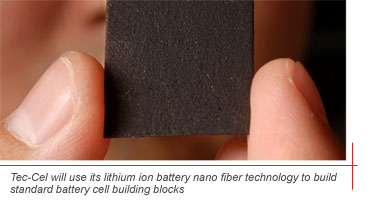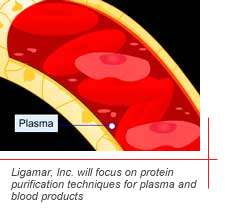

These companies not only move NC State research into the marketplace where it can do the most good, they also generate licensing royalty for the university, provide jobs for the people of North Carolina, and help to strengthen the economy of the state
 Tec-Cel Inc. is commercializing next-generation lithium-ion batteries by using a lithium alloy-carbon composite nano fiber anode technology from NC State's Department of Textile Engineering.
Professor Xiangwu Zhang, a researcher in the College of Textiles invented the proprietary nanofiber technology which enables
the development of batteries that have a theoretical storage capacity10 times greater than current graphite anodes.
Tec-Cel Inc. is commercializing next-generation lithium-ion batteries by using a lithium alloy-carbon composite nano fiber anode technology from NC State's Department of Textile Engineering.
Professor Xiangwu Zhang, a researcher in the College of Textiles invented the proprietary nanofiber technology which enables
the development of batteries that have a theoretical storage capacity10 times greater than current graphite anodes.
When Dr. Zhang disclosed the intellectual property resultant from his research, a team of four graduate students in the Jenkins MBA program’s entrepreneurship technology commercialization concentration supported his work by writing a business plan based on its commercial potential. Members of the graduate student team include Jason Marlow (2009 MBA), Justin Burnette, Marie Kerlau and Richard Wolf.
With a ground-breaking platform technology supported by a thorough business plan, Tec-Cel incorporated in mid 2009 and officially became one of four NC State start-ups of the year.
In June of 2009, NC IDEA awarded Tec-Cel one of five grants ($47,000) to help the company develop prototypes and business infrastructure in order to have a better chance at receiving venture funding. Tec-Cel is the 5th NC State start-up to receive this early seed grant. Others include ImagineOptix, DPoly Systems, AP Solutions, and Physcient.
Tec-Cel will use its lithium ion battery nano fiber technology to build standard battery cell building blocks that will be incorporated by the end system manufacturer into battery packs for laptop computers, hybrid electric vehicles, wireless smart phones, power tools, and other consumer electronics.
Billy Houghteling, Director of the Office of Technology Transfer states: "NC State has successfully transformed its culture of innovation to a culture of entrepreneurship. Tec-Cel is just one example of how students who've receive hands-on entrepreneurial training can make a difference by leading a company through development, inception, and impact. The number of opportunities for students to engage in entrepreneurial activities at NC State is amazing. These students are creative, eager, and excited by the technological and business challenges."
GaN Devices, a power MOSFET (Metal Oxide Seminconductor Field Effect Transister) company, will launch initial products including Power MOSFETs for high power alternative energy generating technologies. The company has submitted a proposal to the National Science Foundation and to the U.S. Department of Defense for a Small Business Technology Transfer (STTR) grant to support R&D activities.
 Launched in FY09, Ligamar Inc.'s focus is to commercialize protein purification techniques for plasma and blood products, based on platform technology from Dr. Ruben Carbonell's Chemical Engineering lab. Dr. Carbonell is the Frank Hawkins Kenan Distinguished Professor of Chemical Engineering at North Carolina State University, served as Department Head of Chemical Engineering from 1994 to 1999, and currently directs the Golden LEAF Biomanufacturing Training and Education Center (BTEC) on NC State's Centennial Campus.
Launched in FY09, Ligamar Inc.'s focus is to commercialize protein purification techniques for plasma and blood products, based on platform technology from Dr. Ruben Carbonell's Chemical Engineering lab. Dr. Carbonell is the Frank Hawkins Kenan Distinguished Professor of Chemical Engineering at North Carolina State University, served as Department Head of Chemical Engineering from 1994 to 1999, and currently directs the Golden LEAF Biomanufacturing Training and Education Center (BTEC) on NC State's Centennial Campus.
In 2006, Dr. Carbonell published a landmark paper describing a small peptide ligand that is able to bind specifically to the Fc fragment of human immunoglobulin G (hIgG). This peptide mimics the specifity of Protein A, and has a wide range of potential applications including industrial scale protein separations, analytical separations, diagnostics, and process analytical technologies. A new corporate entity, Ligamar, Inc., was established to commercialize this ligand discovery approach and to develop new classes of highly specific affinity ligands.
Genesis Semiconductor (GSC) is a start up based in Raleigh, NC and was formed to develop and market proprietary, high-performance power conversion semiconductors. GSC’s low-cost, novel fabrication processes enable integration of multiple power elements to create high-performance power conversion solutions. GSC’s technology will allow a smaller physical package with increased power system efficiency and increased current density with a lower price point than offered in the market today.